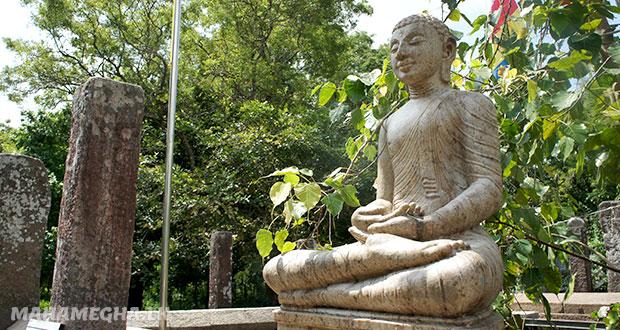The disciples of the Lord Buddha are of four groups; Bhikkhu – monks, Bhikkuni – nuns, Upäsaka –laymen and Upäsika –laywomen. A disciple is a person who identifies himself/herself as a follower of the Lord Buddha and tries to live according to the noble Dhamma by practicing it. We generally call them ‘Buddhists.’ If you are a Buddhist, you belong to one of the categories above. As a disciple, how do you feel about the Lord Buddha? What is your attitude towards the Lord Buddha? How would you behave towards the Lord Buddha? We respect Lord Buddha immensely, we love Lord Buddha profoundly and we would never, even in our wildest dream, think about being hostile towards the Lord Buddha. This is why we get agitated when we see non-Buddhists behave in a disrespectful manner towards the Lord Buddha. When we see the pictures of the Buddha are being used on cloths or slippers we feel angry and we take action to stop that if possible. We think those people are being hostile towards the Lord Buddha. However, the Lord Buddha gives a different explanation on being hostile and not being friendly or respectful towards the Buddha. In Mahasuññata sutta of Majjhima nikaya – middle length discourses, the Lord Buddha explains to venerable Ananda how a disciple behaves with hostility and with friendliness towards the Buddha.
Ananda, behave towards me with friendliness, not with hostility. That will lead to your welfare and happiness for a long time. And how do disciples behave towards the Teacher with hostility, not with friendliness? Here, Ananda, compassionate and seeking their welfare, the Teacher teaches the Dhamma to the disciples out of compassion: “This is for your welfare, this is for your happiness.” His disciples do not want to hear or give ear or exert their minds to understand; they err and turn aside from the Teacher’s Dispensation. Thus, do disciples behave towards the Teacher with hostility, not with friendliness.
And how do disciples behave towards the Teacher with friendliness, not with hostility? Here, Ananda, compassionate and seeking their welfare, the Teacher teaches the Dhamma to the disciples out of compassion: “This is for your welfare, this is for your happiness.” His disciples want to hear and give ear and exert their minds to understand; they do not err and turn aside from the Teacher’s Dispensation. Thus, do disciples behave towards the Teacher with friendliness, not with hostility.
Therefore, Ananda, behave towards me with friendliness, not with hostility. That will lead to your welfare and happiness for a long time.
I do not treat you as a potter treats his raw damp clay. Repeatedly explaining, I speak to you, Ananda. Repeatedly clarifying wholesomeness from unwholesomeness, I speak to you, Ananda. I do so to rescue you from the fruitless and establish you in what is fruitful.
Therefore, it is clear that the difference between being hostile and being friendly/respectful towards the Lord Buddha depends on how a disciple practices the noble Dhamma. In this great sutta the Lord Buddha explains various methods of practicing the noble Dhamma that leads the disciple who follows it, to complete disenchantment, dispassion, cessation, peace, direct knowledge and supreme bliss of Nibbana.
The noble path towards Nibbana is developed through Seela- virtue, Samadhi-concentration and Pañña – wisdom. So, how can a disciple behave towards the Lord Buddha with hostility when practicing Seela, Samadhi and Pañña? And how can a disciple behave with friendliness when doing the same?
According to the above excerpt of the sutta, when the Lord Buddha explains the Seela with compassion, the benefits of Seela and the dangers of not protecting the Seela, a disciple who does not want to hear it or strive to understand it and practice it by protecting Seela is someone who behaves towards the Lord Buddha with hostility. He is someone who has fallen from the Lord Buddha’s dispensation. On the other hand, a disciple who listens to the suttas that explains Seela, try hard to comprehend and even harder, amidst all difficulties, to protect Seela, behaves towards the Lord Buddha with friendliness, with respect. He/she is the one who does not turn away from the dispensation.
The Lord Buddha has explained in great detail about how Seela can help a disciple live a regretless, noble life. And how it can help one to achieve Samadhi, and how it helps one to be born in a heavenly world and finally how essential Seela is to attain Nibbana. So if a disciple slacks in protecting Seela, thinks that nowadays it is not possible to live by the precepts, then his conduct is hostile towards the Lord Buddha.
In the same way, if a disciple is not striving hard, with all his might to achieve a concentrated mind – Samadhi, then he/she is someone who is hostile towards the Teacher and turned away from the Teacher’s dispensation. The Lord Buddha reiterated the importance of Samadhi in many discourses. He explained higher levels of concentration (jhana) and differing mental absorptions (samapatti). If a disciple learns about these extraordinary mental attainments and develop faith in them, faith in the knowledge of the Lord Buddha on Samadhi, and try to the best of one’s ability to develop a concentrated mind, then he/she is someone who behaves respectfully towards the Teacher.
Similarly, when the Lord Buddha explains in so many ways the importance of Panna, how to develop Panna and the benefits that a mind developed in Panna brings, if a disciple ignores it and not exert him/herself to develop in Panna then he/she is someone who behaves towards the Teacher with hostility. He/she has fallen away from the Buddha’s dispensation. The disciple who exert his/her mind to develop in Panna is the one who is friendly towards the Lord Buddha.
The meditation on six sense faculties, the meditation on elements, the meditation on five aggregates of clinging, meditation on dependent origination are repeated extensively and concisely in many discourses by the Lord Buddha. If a disciple is not taking the effort to learn them and remember them and practice them and contemplate on them repeatedly, then his/her behavior towards the Lord Buddha is hostile.
Now, do you see how we could be hostile, unintentionally, toward our great Teacher, the Thathagatha, the fully enlightened and Perfect Teacher? If we are obsessed with mundane goals of life and have a lackluster attitude towards spiritual development, and think it is hard to live by the precepts or find time to meditate, then our conduct towards the Lord Buddha is hostile.
Therefore we should all aspire to be friendly towards our most compassionate teacher, Lord Buddha, by molding our lives in accordance with his sublime teachings; the Noble Dhamma. Doing so would bring us happiness in this life, next life, and also the chance to embrace the ultimate bliss of Nibbana.
Prajapathi Jayawardena











Recent Comments